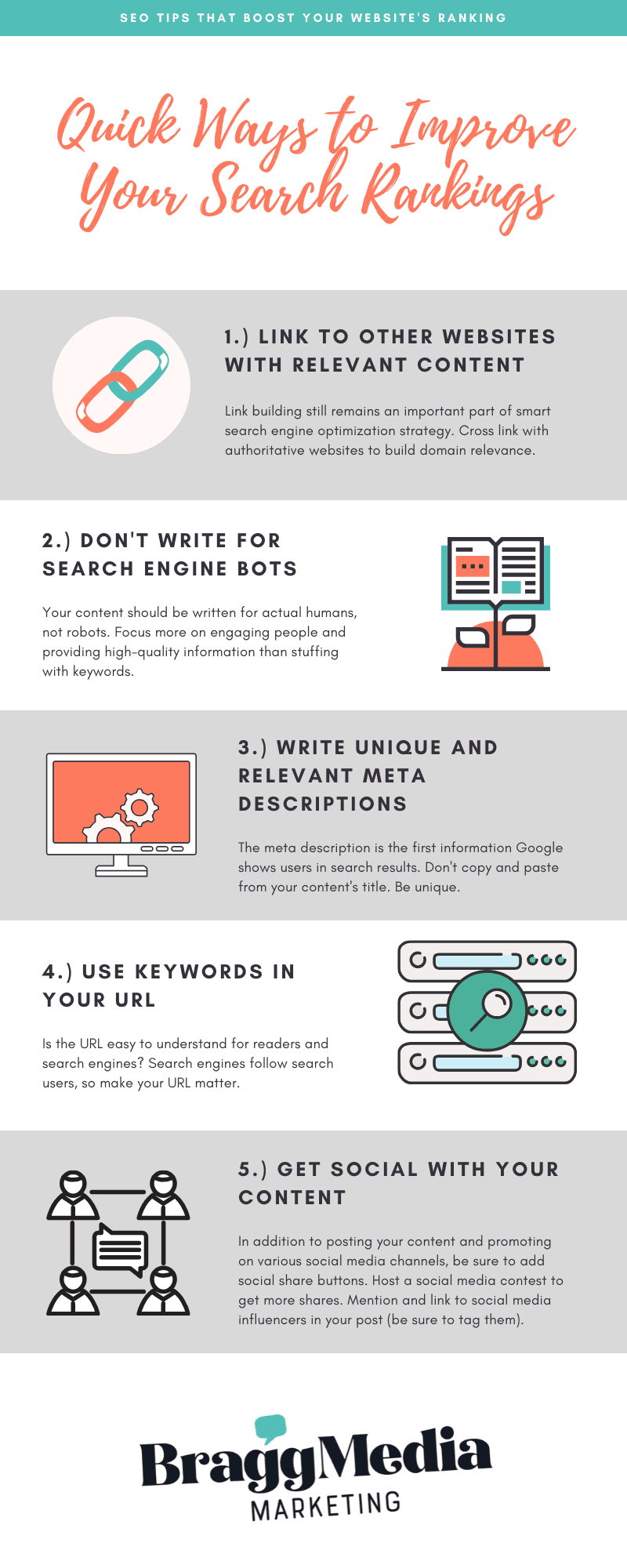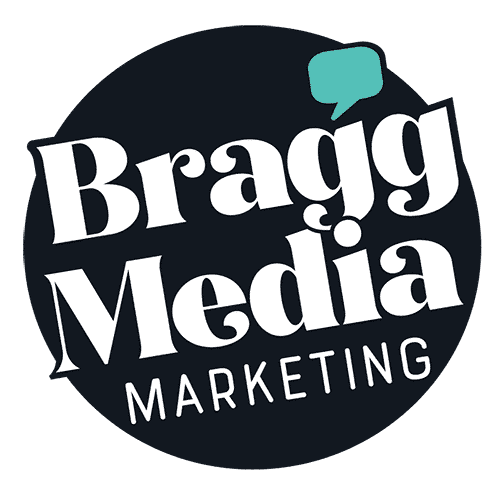
A client once told me, “I heard that the only page on the website that matters is the homepage.”
My response?
Yes, the homepage is important — crucial even (read on) — but it’s hardly the most important part of a website’s Search Engine Optimization (SEO) plan.
The bottom line for all traditional and digital marketing marketing: the only SEO tasks that matter are those that bring in quality leads to a business. Let’s say a website has the best SEO of all time, generating a horde of new traffic. Is your website bringing eyeballs or leads? If it’s bringing in leads (awesome job!), what kind of leads are they?
Don’t let SEO get in the way of good marketing. Here are some SEO myths that get in the way of results:
Get social with us!
Like what you’re reading?
Subscribe to Bragg Media’s
monthly newsletter.
SEO Myth: The homepage is all that matters
It’s not uncommon for marketing professionals and business owners to place too much emphasis on the proverbial homepage. They mistakenly think that every link and every keyword related to their business and industry should appear on this single page.
But it doesn’t.
The most profitable leads from digital marketing that I’ve personally seen come from users who have seen a video on LinkedIn, read a blog post promoted on Facebook or clicked a link in an e-newsletter. Some of my best clients have never even been to my website’s homepage.
Think of the homepage like a hotel lobby. It’s the first thing people see, and it’s where you “greet” your visitors. While you wouldn’t want an empty lobby — you also don’t want it to be overwhelmingly cluttered.
Balance is key. Can you think of a hotel you visited where you were immediately drawn in by the lobby? It probably includes the essentials — a desk and computer, some decor for personality and maybe a few little “extras” to feel inviting (such as coffee or cookies on a side table).
Translate this concept to the website’s homepage: Include inbound links to the essential parts of your site — to blogs, to specific services, to an “about me” or to a contact page, etc. It doesn’t hurt to throw a few “freebies” in there as well.
Overall, the homepage should be clean, organized and welcoming. Your audience is too savvy to fall for blatant sales machines. They want the buying decision to be theirs, not yours.
 Website Design
Website Design
Affordable website design with a process that works for you.

SEO Myth: Blogging doesn’t really work.
Because of this, more digital marketing agencies are focusing on content than ever before:
Pillar pages or cornerstone content pages:
These areas of the website include well-researched, well-written and well-organized articles about a particular subject. They often include images, videos, graphics, outbound links and inbound links.
Blog posts:
Cornerstone content or pillar pages should contain multiple links to blog posts that expand or elaborate on an idea expressed in the pillar page. Blog posts have a cumulative effect because they “live forever,” continually bring in traffic to the website for years to come.
A well-rounded social media presence:
By promoting your website content on Facebook, Instagram, Twitter or Pinterest, not only will you bring more traffic to your website, you’re also telling search engines that your content is legitimate.
 Website Audit
Website Audit
How well do you know your website?

SEO Myth: Page 1 Google is all that matters
While marketing studies show a correlation between high search engine ranking and clickthrough rates, search ranking is not as powerful as it used to be. The top three results on the first page tend to achieve more clicks — but so do the top three on the next page.
And the page after that.
And the page after that.
(You get the picture).
While the goal of any website is high traffic, that traffic does nothing if potential customers aren’t seeking out your product or service. While ranking No. 1 in a Google search can get more eyes on your site, that’s not guaranteed success.
People need to find your site useful and be drawn in enough with quality content to seek out your services. We’re talking leads, here.
SEO Myth: Use as many keywords as possible
I have read many a blog that tried to rank for “best company” or “company in Bluffton SC” only to sound like a robot wrote the piece. When keywords interfere with the information you want to get across, it’s time to rethink the excessive use of keywords.
Using too many keywords — or “stuffing your SEO” — will actually hurt your rankings. It’s against Google’s guidelines, and they will penalize your website if you’re abusing the system. Keywords must always be relevant to your topic; you can’t just pick a word that’s trending on Twitter and use it as a keyword.
When search engine optimization first became widely known, the focus was on seeking out a dozen or so “big” keywords that would help rank your topic. Now, Google uses an algorithm that finds keyword topics that are related to each other — and leaves us with thousands of variations for each topic.
While keywords matter, you’re never going to find the “perfect 10” — and you’ll never dominate a search based on any specific keyword.
Today’s end user also searches in a more conversational way. For example: If you’re trying to plan a family vacation on Hilton Head, would you search, “Hilton Head SC attractions” or “things to do on Hilton Head?” Probably the second option, right?
SEO Myths: The more links, the better
The more links, the better. Right? Not quite.
Remember: Quality over quantity.
Just like you shouldn’t create crappy content to get more traffic on your website, saturating your site with not-so-great links won’t do you any favors either.
So, what’s the limit to the number of links a single page should contain?
Moz says the sweet spot is considered no more than 100 links. They say, “There’s an inescapable reality in SEO that the more links a page has, the less internal PageRank each of those links passes.”
However, quality linking matters. If your site contains spammy links in pursuit of search engine ranking, your site could be potentially penalized by Google. Worse, you break the trust of your audience. Once that’s gone, Google will follow.
The final word about how to improve SEO.
Instead of a strategy hyper-focused on quantity: number of links and number of keywords, reshift the focus to quality.
Quality content has been mentioned at least three times in this blog post so far. But what does that actually mean?
Does quality mean stuffing your content with as many keywords as possible? No!
Keywords are meaningless without well-written, well-researched content. Cornerstone content/pillar pages are often referred to evergreen content because they offer information that is timeless and rarely changes with passing time.
Quality content includes articles that are well-researched, well-organized and well-written.
The point? The longer these pages are useful, the more it will rank higher in search engine results and the more readers will keep coming back for more.
Looking for a website?
Check out how we serve these markets:
 Bragg Brand Bootcamps
Bragg Brand Bootcamps
For businesses that need a lot of brand identity work, sooner than later.
